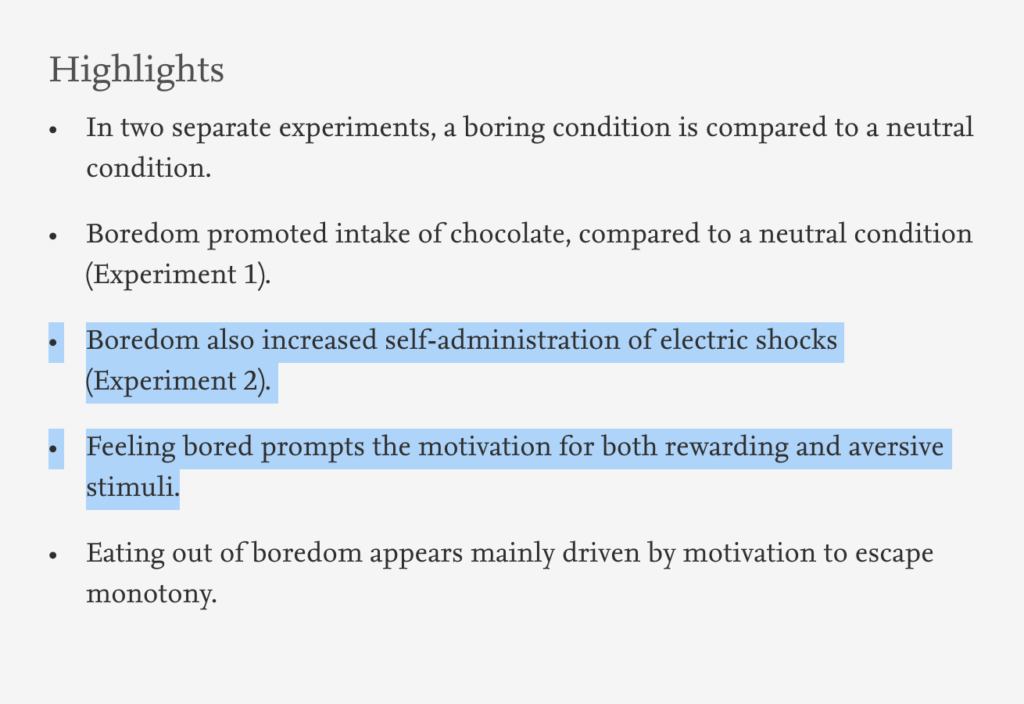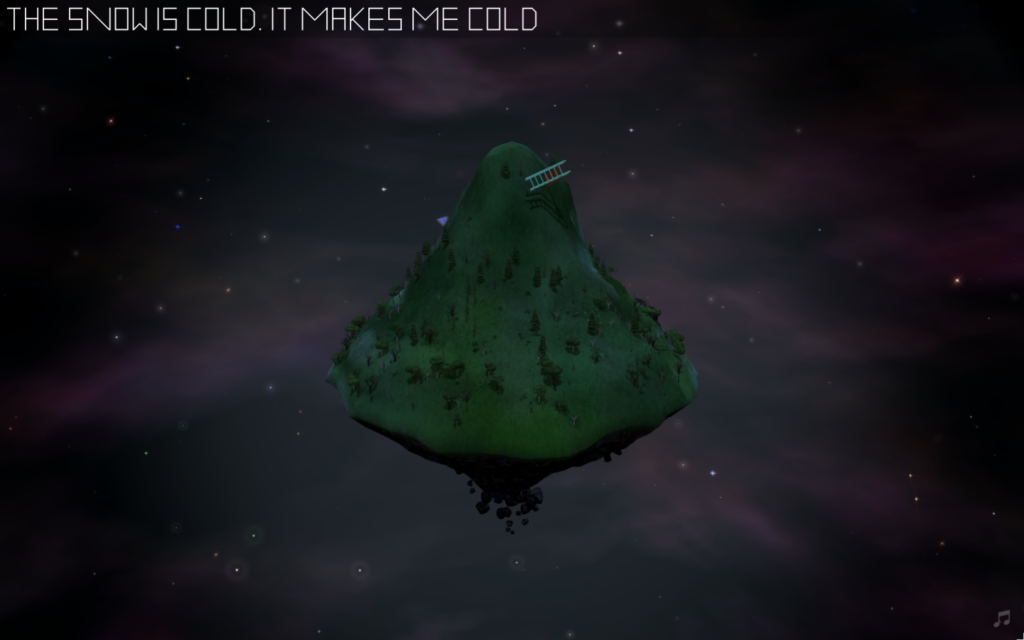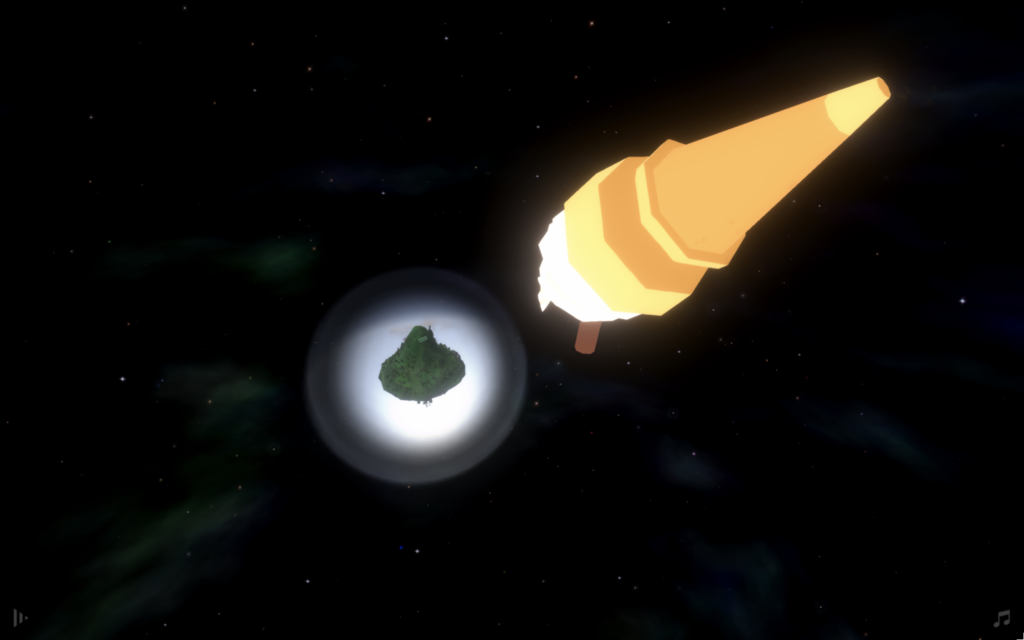PART I: BOREDOM
Before downloading Mountain, I saw some reviews calling the game a glorified screensaver or recommending that the best way to play was to take your dog on a walk until your computer battery ran out, and I thought that was harsh. After downloading, I find myself reminded of the experiment where people voluntarily subjected themselves to electric shocks to avoid boredom and monotony (Figure 1).

Mountain, for myself and many others, was boring. The kind of boring where I was searching for something to do and, should I have found myself unable to toggle between tabs or interact with anything besides Mountain, I easily could see myself administering electric shocks just to be stimulated. There were a few elements of interactivity–disturbing the birds in the trees, tediously dragging crash-landed materials out of orbit, playing a melody on the keypad–but those quickly lost their charm. Cookie Clicker and Universal Paperclips have much less impressive art, but they elicit consistent dopamine hits became of the interactive clicking, the product numbers going up, the stream of upgrades; the energetically-changing environment.
The most dynamic, dopamine-inducing part of Mountain, for me, was the ~ding~ when a new thought had surfaced. And yet, thought after thought, anticipation plummeted into deflation when I actually checked that notification. This is a feeling James Hodge describes in his essay, commenting that the notification “wouldn’t feel so deflating or disappointing if its sonic arrival didn’t tap into a latent urge for connection” and then fail to connect. I wasn’t invested in this mountain or its adages. Briefly, I was intrigued by an angle investigating whether there was religious subliminal messaging to phrases like “communion” and “day of days,” but that faded, and I was left thinking that my reaching for a philosophical meaning was further testament (ha) to my boredom.

this one took the cake. It could have at least been snowing.
PART II: GAMIFICATION
Maybe Mountain is fine for what it is… but many have been hard-pressed to consider “it” a game. Without getting into the huge debate about what makes a game, I would like to make a proposal for how to gamify Mountain, adding more interactivity and a narrative message. To clarify, my post is not intended as a criticism of the creators or a proclamation that I am a better designer than them; it is an expansion inspired by what they created.
While watching (yes, watching; not playing) Mountain, I craved for something–anything–to do. Being able to disturb the birds was a welcome surprise, but not being able to assert my control in other ways was frustrating. I even tried to crush the chirping skull with the sink (at the time, the only objects on the mountain) and the sink just phased through the skull.
Why did I resort to destruction so early? It took only a hint of hesitation and twinge of guilt to think of shattering the skull with the sink, just for something to happen. Rustling the trees was a staple of my gameplay because I got to see my pretty bird animation, but was my brief escape from monotony worth the birds losing safe shelter? They’re only code, sure, but what if this inclination towards doing “something–anything–” was taken to a logical conclusion? What if you could chop down trees, and they disappear? I would imagine a lot of players would start chopping down a significant number of trees, only to realize that they are left with fewer interactable (and purely visual) objects than they started with. What if this became a societal critique like that of the Lorax and the Onceler? Your neglect can cause the mountain to be littered with non-natural and ugly objects, but you also have the option to actively partake in the destruction of the planet. And before anyone retorts that this game’s message would be putting the blame of climate change on individuals, remember that the player is not an individual in the game’s narrative. They aren’t even a monopolistic corporation. They are GOD.
Conclusion
Ultimately, I don’t hate Mountain. I am glad critics (and maybe you!) found Mountain so moving. It certainly subverts medium and genre expectations, but you can also consider my proposal to transform Mountain into a not-so avant-garde piece of art. I didn’t find the game to be enjoyable, but I experienced fleeting moments of enjoyment; fleeting moments of the strangeness, humor, reflection that critics such as Caleb Wood lauded. Unlike Caleb Wood (probably), my greatest swelling of emotion coincided with the swelling of the soundtrack; I was most desperately desiring when I realized my mountain had the potential to be destroyed. I was genuinely euphoric when I realized I could change perspective to the meteoric ice cream cone. The change of pace and the subversion of expectations was a monumentally satisfying ending to the game, but when the end screen gave me the option to retry/replay, I didn’t even consider it.

I’m interested in what you tried or wanted to do in Mountain, even (and especially) if it goes against everything Mountain stands for.


WORKS CITED because I wrote this at 2am without any regard for journalistic integrity. Also, did y’all know there’s an MLA 9 now?!
Hodge, James J. “Sociable Media: Phatic Connection in Digital Art.” Postmodern Culture, vol. 26 no. 1, 2015. Project MUSE, doi:10.1353/pmc.2015.0021.
Nederkoorn, Chantal, et al. “Self-Inflicted Pain out of Boredom.” Psychiatry Research, vol. 237, 30 Mar. 2016, pp. 127–132., https://doi.org/10.1016/j.psychres.2016.01.063.
Wood, Caleb. “Game Review: Mountain by David OReilly.” Cartoon Brew, 9 July 2014, https://www.cartoonbrew.com/games/game-review-mountain-by-david-oreilly-101108.html.
I am so happy you wrote this post because that same study (or, to be honest, the VSauce YouTube video that mentioned it) is what popped up in my head during today’s discussion on boredom! Also I must say that it makes for an awesome title – “Would You Rather: ‘Play’ Mountain or Electrically Shock Yourself?” is something I simply couldn’t not click on.
And I’ll be frank, I sit with you in the camp that would rather shock myself than play Mountain, mainly, because I, like Bruno from class today, consider myself to be an “iPad Baby” – I need to be constantly stimulated, constantly doing something, and remain constantly productive. It’s no surprise that I would prefer physical pain than playing this game. Nevertheless, I am doubtful that Mountain isn’t aware of this feeling. In fact, I think Mountain could be about boredom – look at its superficial notifications and ending, which seem to mock the want for progress in the first place. As trite as it is to say, could this be a critique of capitalism, and how constant productivity desire strips us from our ability to enjoy leisure?
Entirely possible! I certainly thought the graphics were meditative, but couldn’t force myself to meditate along with them, instead thinking about the many other assignments I needed to attend to. That could also explain why the ending felt so euphoric to me: It was a completion, a hallmark of productivity. Or, perhaps, Mountain successfully brought about a “profound boredom” that culminated in this blog post:)
Yeah so I’m obsessed with this and also the title of the blog post. Honestly, perhaps would shock myself. Couldn’t be that bad, right? Maybe I have to much beef with idle games, but in short– you summarize the game well and provide a juicy soundbite of analysis